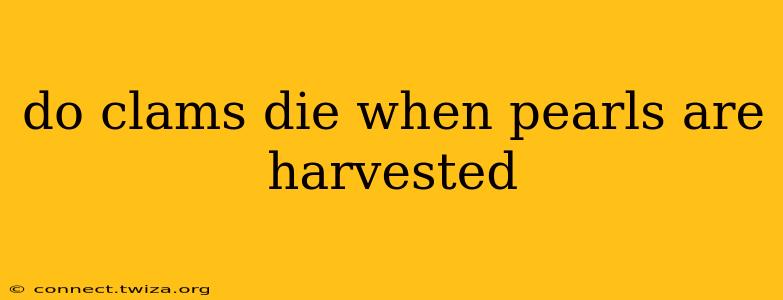Do Clams Die When Pearls Are Harvested? The Truth About Pearl Farming
The question of whether clams die when pearls are harvested is a complex one, sparking concerns about the ethical and environmental implications of pearl farming. The answer, unfortunately, isn't a simple yes or no. It depends heavily on the type of pearl harvesting and the farming practices employed.
Let's delve into the details to understand the different scenarios and the impact on the mollusks.
What are the different types of pearl harvesting?
There are two primary methods of pearl harvesting:
-
Natural Pearl Harvesting: This involves finding pearls naturally formed within wild oysters or mussels. This method is far less common today due to the rarity of naturally occurring pearls of high quality. The harvesting of natural pearls often results in the death of the mollusk, as the pearl is typically retrieved only after the organism has died.
-
Cultured Pearl Harvesting: This is the dominant method used today. In this process, farmers carefully insert a nucleus (often a small bead) into a living mollusk, along with a piece of mantle tissue. This stimulates the mollusk to produce a pearl around the nucleus. After a period of time (usually several months to a few years), the pearl is harvested. In responsible, sustainable cultured pearl farming, the mollusk usually survives the harvest. The pearl is carefully removed, and the mollusk is returned to the water to potentially produce another pearl.
How does sustainable pearl farming minimize clam mortality?
Sustainable pearl farming prioritizes the health and survival of the mollusks. This involves:
- Careful surgical techniques: Skilled technicians use minimally invasive procedures to extract the pearls, causing minimal harm to the mollusk.
- Post-harvest care: After harvesting, the mollusks are carefully monitored and given time to recover before being returned to their environment.
- Optimal water conditions: Maintaining healthy water quality is essential for the survival and well-being of the mollusks.
- Disease prevention: Regular monitoring and disease management protocols are crucial in preventing outbreaks that could impact the entire population.
Are there instances where clams die during pearl harvesting?
While responsible farming aims for zero mortality, some clams can die during the process, even with the most careful techniques. This can occur due to:
- Infection: Even minor wounds during the harvesting process can lead to infection if not properly treated.
- Stress: The process itself, even when minimally invasive, can stress the mollusk, potentially weakening its immune system and making it more susceptible to disease.
- Poor farming practices: Unfortunately, not all pearl farms operate with the same level of care and sustainability. Poor water quality, overcrowding, and inadequate post-harvest care can significantly increase mortality rates.
How can I ensure I'm buying ethically sourced pearls?
Choosing ethically sourced pearls requires careful consideration and research. Look for certifications or labels from organizations dedicated to sustainable aquaculture practices. Ask questions about the farming practices used to ensure the pearls are harvested responsibly, minimizing harm to the mollusks and the environment.
What are the environmental impacts of pearl farming?
While sustainable practices minimize negative impacts, pearl farming can still have environmental consequences if not managed properly. These can include:
- Water pollution: Improper waste disposal can contaminate the surrounding water.
- Habitat destruction: Overcrowding or inappropriate farming locations can damage delicate marine ecosystems.
- Disease transmission: Poorly managed farms can contribute to the spread of diseases to wild mollusk populations.
Choosing sustainably sourced pearls supports responsible farming practices and helps protect the marine environment. By being a mindful consumer, we can encourage and support better farming practices for all involved, including the mollusks that produce these beautiful gems.
